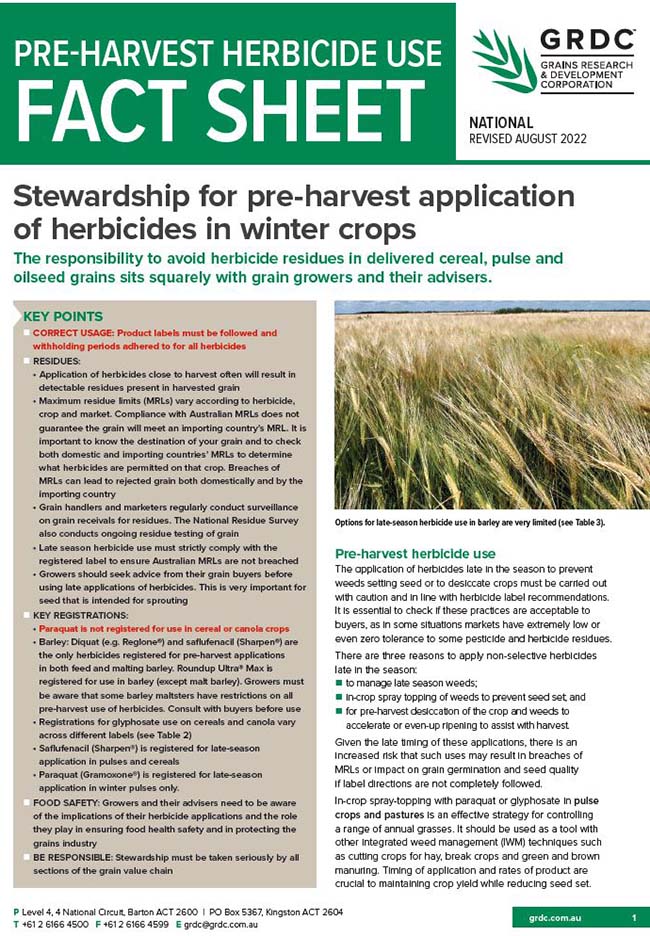Pre-harvest herbicide use
Pre-harvest herbicide use
Published: 23 Aug 2022
Grain growers and advisers are responsible for ensuring delivered grain does not exceed maximum residue levels (MRLs). This fact sheet answers common questions about applying herbicides pre-harvest in winter crops.
All sections of the grain industry are responsible for careful and responsible management of herbicides in grain crops.
Product labels and withholding periods
Growers must follow the directions on product labels and adhere to all herbicide withholding periods.
Residues
- If growers apply herbicides close to harvest, the harvested grain can often contain detectable residues.
- Maximum residue limits (MRLs) vary according to herbicide, crop and market. Complying with Australian MRLs does not guarantee the grain will meet the MRL of an export market.
- Know the destination(s) of your grain and check MRLs for each destination.
- If your grain does not comply with MRLs, it may be rejected.
- Grain handlers and marketers check grain for residues. The National Residue Survey also conducts ongoing residue testing of grain.
- Late season herbicide use must strictly comply with the registered label to ensure Australian MRLs are not breached.
- Growers should seek advice from their grain buyers before using late applications of herbicides. This is very important for seed that is intended for sprouting
- Paraquat is not registered for use in cereal or canola crops.
- Registrations for glyphosate use on cereals and canola vary across different labels (see Table 2 in the PDF).
- Saflufenacil (Sharpen®) is registered for late-season application in pulses and cereals.
- Paraquat (Gramoxone®) is registered for late-season application in winter pulses only.
- Diquat (e.g. Reglone®) and saflufenacil (Sharpen®) are the only herbicides registered for pre-harvest applications in both feed and malting barley.
- Some barley maltsters have restrictions on all pre-harvest use of herbicides.
- Roundup Ultra® Max is registered for use in barley (except malt barley). Consult with buyers before use.
Key registrations
Cereals and canola
- Paraquat is not registered for use in cereal or canola crops.
- Registrations for glyphosate use on cereals and canola vary across different labels (see Table 2 in the PDF).
Pulses and cereals
- Saflufenacil (Sharpen®) is registered for late-season application in pulses and cereals.
- Paraquat (Gramoxone®) is registered for late-season application in winter pulses only.
Barley
- Diquat (e.g. Reglone®) and saflufenacil (Sharpen®) are the only herbicides registered for pre-harvest applications in both feed and malting barley.
- Some barley maltsters have restrictions on all pre-harvest use of herbicides.
- Roundup Ultra® Max is registered for use in barley (except malt barley). Consult with buyers before use.
Food safety
Growers and their advisers play a critical role in:
- ensuring food health safety and
- protecting the grains industry.
Download PDF
Region: National

